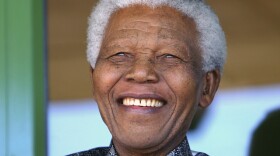Nelson Mandela, who became an icon of the struggle for racial equality during a decades-long struggle against South Africa's apartheid system, is being remembered across the globe on Thursday following his death at age 95.
Mandela died after a prolonged lung infection, which had been a recurring problem for him since his days as a prisoner of conscience on South Africa's Robben Island. He served 27 years at the notorious jail.
"He is now resting. He is now at peace," South African President Jacob Zuma said in an address to the nation.

"Although we knew that this day would come, nothing can diminish our sense of a profound and enduring loss," he said.
President Obama said Mandela "achieved more than can be expected of any man. Today he has gone home."
"He no longer belongs to us; he now belongs to the ages," Obama said.
"Through his fierce urgency and unbending will, Madiba transformed South Africa and all of us," he said, referring to Mandela by his clan name. "His journey from a prisoner to a president embodied the promise that human beings and countries can change for the better."
The first black president of the United States said of South Africa's first black president, "I can't imagine my life without the example Mandela set."
Obama also ordered that the U.S. flag fly at half-staff on all public buildings and grounds, until sunset on Monday.
F.W. de Klerk, South Africa's last white president, said on the BBC that he and Mandela had "become good friends" over the years.
"We had our moments of tension as political opponents, but after our retirement and at times during his presidency, we became very close," de Klerk said. "He's a remarkable man. He was a remarkable man."
The United Nations Security Council interrupted a meeting on the tribunals for the former Yugoslavia and Rwanda and stood for a minute of silence.
Argentina's U.N. Ambassador Maria Cristina Perceval, who was speaking when the council learned of the news, said: "Good men and women, men such as Mandela resisted and taught us to resist fear ... to resist oblivion."
U.N. Secretary-General Ban Ki-moon called him "a giant of justice" who "touched our lives in a deeply personal way."
Former President George W. Bush said that he and former first lady Laura Bush "join the people of South Africa and the world in celebrating the life of Nelson Rolihlahla Mandela."
"President Mandela was one of the great forces for freedom and equality of our time. He bore his burdens with dignity and grace, and our world is better off because of his example," Bush said.
Former President Bill Clinton, said: "We will remember him as a man of uncommon grace and compassion, for whom abandoning bitterness and embracing adversaries was not just a political strategy but a way of life."
He tweeted:
And International Monetary Fund chief Christine Lagarde:
British Prime Minister David Cameron said "a great light has gone in the world" and that Mandela was "a legend in life and now in death."
House Speaker John Boehner called Mandela "an unrelenting voice for democracy," and Democratic leader Nancy Pelosi said the world had "lost a leader who advanced the cause of equality and human rights."
Actor Morgan Freeman, who portrayed Mandela in the 2009 film Invictus, described him as a "true giant."
Secretary of State John Kerry remembered a visit with Mandela in 2007 over the Thanksgiving holiday: "I was struck by how warm, open, and serene he was."
New York Mayor Michael Bloomberg, who presented Mandela with a key to the city in 2005, said the South African leader's visit weeks after the September 11, 2001, attack on the World Trade Center towers, "helped give our city strength and hope, for which we will be forever grateful." Flags at City Hall were lowered to half-staff in Mandela's honor.
We'll continue to update this post as reaction to Mandela's death comes in.
Copyright 2020 NPR. To see more, visit https://www.npr.org. 9(MDAxNDQ2NDAxMDEyNzU2NzM2ODA3ZGI1ZA001))





